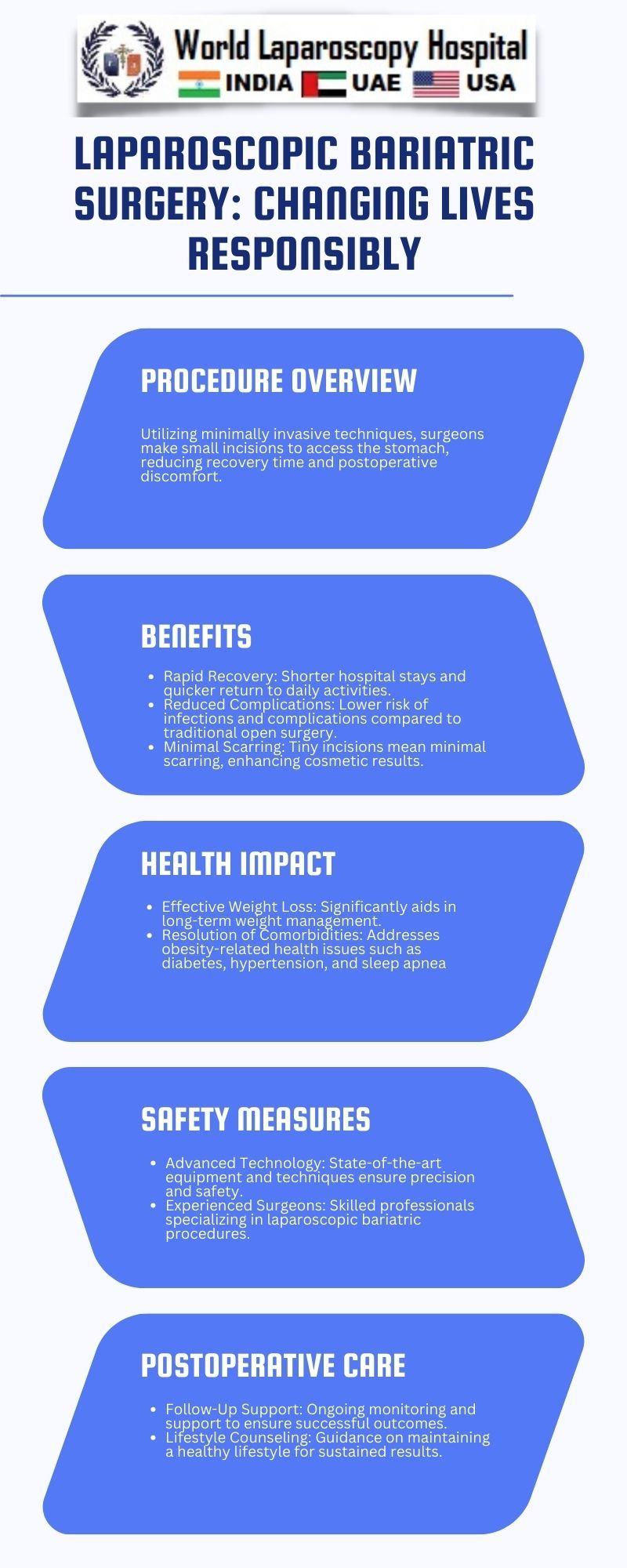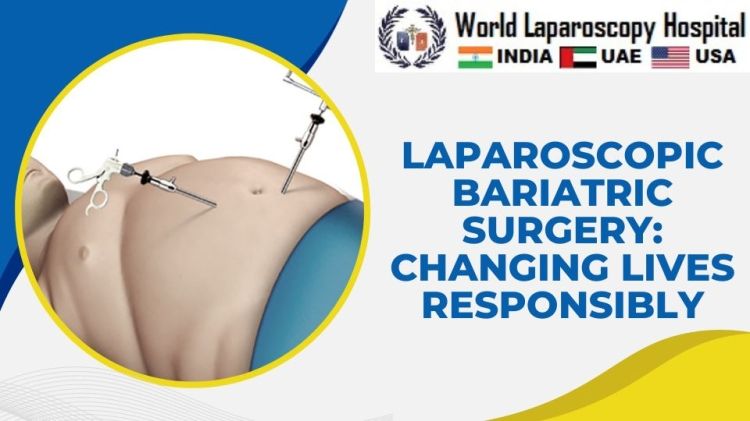Laparoscopic Bariatric Surgery: Changing Lives Responsibly
Introduction:
In the realm of weight management, the evolution of medical procedures has paved the way for transformative interventions, with laparoscopic bariatric surgery emerging as a beacon of hope for individuals grappling with obesity. This minimally invasive surgical technique not only facilitates significant weight loss but also instigates responsible lifestyle changes, fostering a holistic approach to health and well-being.

Understanding Obesity:
Before delving into the nuances of laparoscopic bariatric surgery, it is imperative to comprehend the gravity of the obesity epidemic. Obesity is a multifaceted health condition associated with numerous comorbidities, including cardiovascular diseases, diabetes, and psychological challenges. Traditional weight loss methods often prove ineffective for individuals with severe obesity, necessitating advanced interventions for sustainable results.
Evolution of Bariatric Surgery:
Historically, bariatric surgery has undergone a transformative journey. Initially introduced as an open surgical procedure, advancements in medical technology led to the development of laparoscopic techniques. This shift drastically reduced the invasiveness of the procedure, resulting in quicker recovery times, reduced postoperative pain, and improved cosmetic outcomes.
Laparoscopic Approach Unveiled:
Laparoscopic bariatric surgery involves the use of small incisions and specialized instruments, allowing surgeons to perform intricate procedures with enhanced precision. The procedure typically includes various techniques such as gastric bypass, sleeve gastrectomy, and adjustable gastric banding. Each technique addresses obesity through different mechanisms, catering to the unique needs of individual patients.
Gastric Bypass:
Gastric bypass, a common laparoscopic bariatric procedure, involves the creation of a smaller stomach pouch and rerouting of the small intestine. This restricts the amount of food intake and reduces nutrient absorption, leading to significant weight loss.
Sleeve Gastrectomy:
Sleeve gastrectomy entails the removal of a portion of the stomach, resulting in a sleeve-shaped structure. This reduces the stomach's capacity, curbing the intake of food and promoting a sense of fullness with smaller meals.
Adjustable Gastric Banding:
In adjustable gastric banding, a band is placed around the upper part of the stomach, creating a smaller pouch. This limits food intake and induces a feeling of satiety. The band can be adjusted to regulate the rate of weight loss.
Benefits of Laparoscopic Bariatric Surgery:
The advantages of laparoscopic bariatric surgery extend beyond mere weight loss. Patients often experience improved metabolic health, resolution of obesity-related comorbidities, and enhanced quality of life. The minimally invasive nature of the procedure contributes to reduced postoperative pain, shorter hospital stays, and quicker recovery, enabling individuals to resume normal activities sooner.
Metabolic Health Improvement:
Bariatric surgery has been shown to positively impact metabolic health by improving insulin sensitivity and glucose metabolism. Many patients with obesity-related type 2 diabetes experience significant remission after undergoing laparoscopic bariatric procedures.
Comorbidity Resolution:
The surgery often leads to the resolution or improvement of obesity-related comorbidities such as hypertension, sleep apnea, and joint pain. This holistic approach addresses the interconnectedness of obesity and its associated health challenges.
Enhanced Quality of Life:
Beyond physical health benefits, patients commonly report improvements in mental well-being and overall quality of life. The positive impact on self-esteem and body image can be profound, fostering a renewed sense of confidence and empowerment.
Responsible Lifestyle Changes:
While laparoscopic bariatric surgery provides a powerful tool for weight loss, its success is intricately linked to the adoption of responsible lifestyle changes postoperatively. Patients are often required to make dietary modifications, incorporate regular physical activity, and attend counseling sessions to address psychological aspects of their journey.
Dietary Modifications:
Following surgery, patients adhere to a phased dietary plan, gradually reintroducing solid foods. Nutrient-dense, portion-controlled meals become essential components of postoperative nutrition. Dietary counseling guides individuals in making sustainable and health-conscious food choices.
Regular Physical Activity:
Physical activity is paramount in maintaining long-term weight loss and overall well-being. Postoperative guidelines emphasize the gradual incorporation of exercise into daily routines, accommodating individual fitness levels and preferences.
Psychological Support:
The psychological impact of weight loss surgery is significant, and many individuals benefit from ongoing counseling and support. Addressing body image concerns, coping with lifestyle changes, and fostering a positive relationship with food are integral components of postoperative psychological support.
Challenges and Considerations:
While laparoscopic bariatric surgery offers a myriad of benefits, it is essential to acknowledge the challenges and considerations associated with this transformative intervention.
Surgical Risks:
Despite being minimally invasive, any surgical procedure carries inherent risks. Complications such as infection, bleeding, and anesthesia-related issues can occur, emphasizing the importance of a thorough preoperative assessment and postoperative monitoring.
Nutritional Deficiencies:
Alterations in the digestive system may lead to nutrient malabsorption, necessitating vigilant monitoring of nutritional status. Patients often require lifelong supplementation of vitamins and minerals to prevent deficiencies.
Psychosocial Impact:
The psychological impact of significant weight loss should not be underestimated. While many individuals experience positive changes, others may face challenges related to body image, relationships, and adjustments to their new lifestyle.
Conclusion:
Laparoscopic bariatric surgery stands at the forefront of transformative weight loss interventions, offering hope to those grappling with severe obesity. Its impact extends beyond physical changes, encompassing metabolic health improvements, comorbidity resolution, and enhanced quality of life. However, success hinges on the integration of responsible lifestyle changes, acknowledging the multifaceted nature of obesity management. As technology continues to advance and research progresses, laparoscopic bariatric surgery remains a dynamic field, reshaping lives responsibly and promoting enduring well-being.






